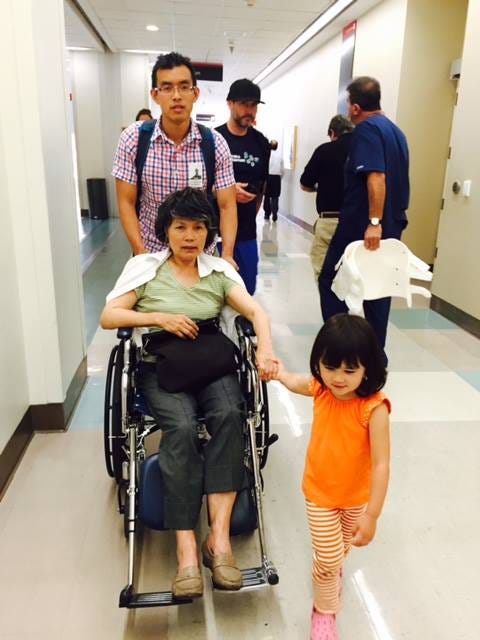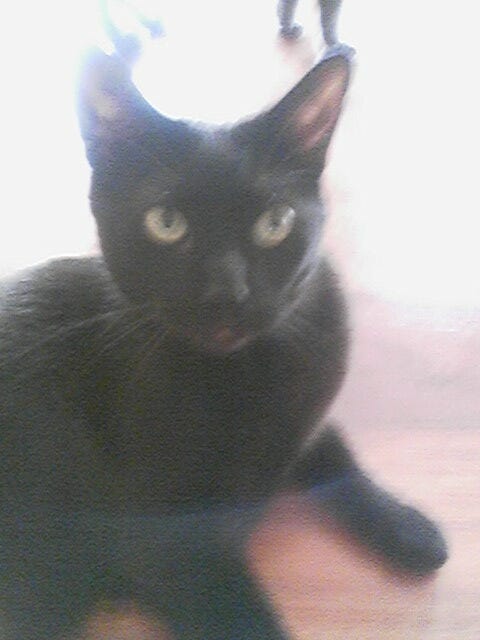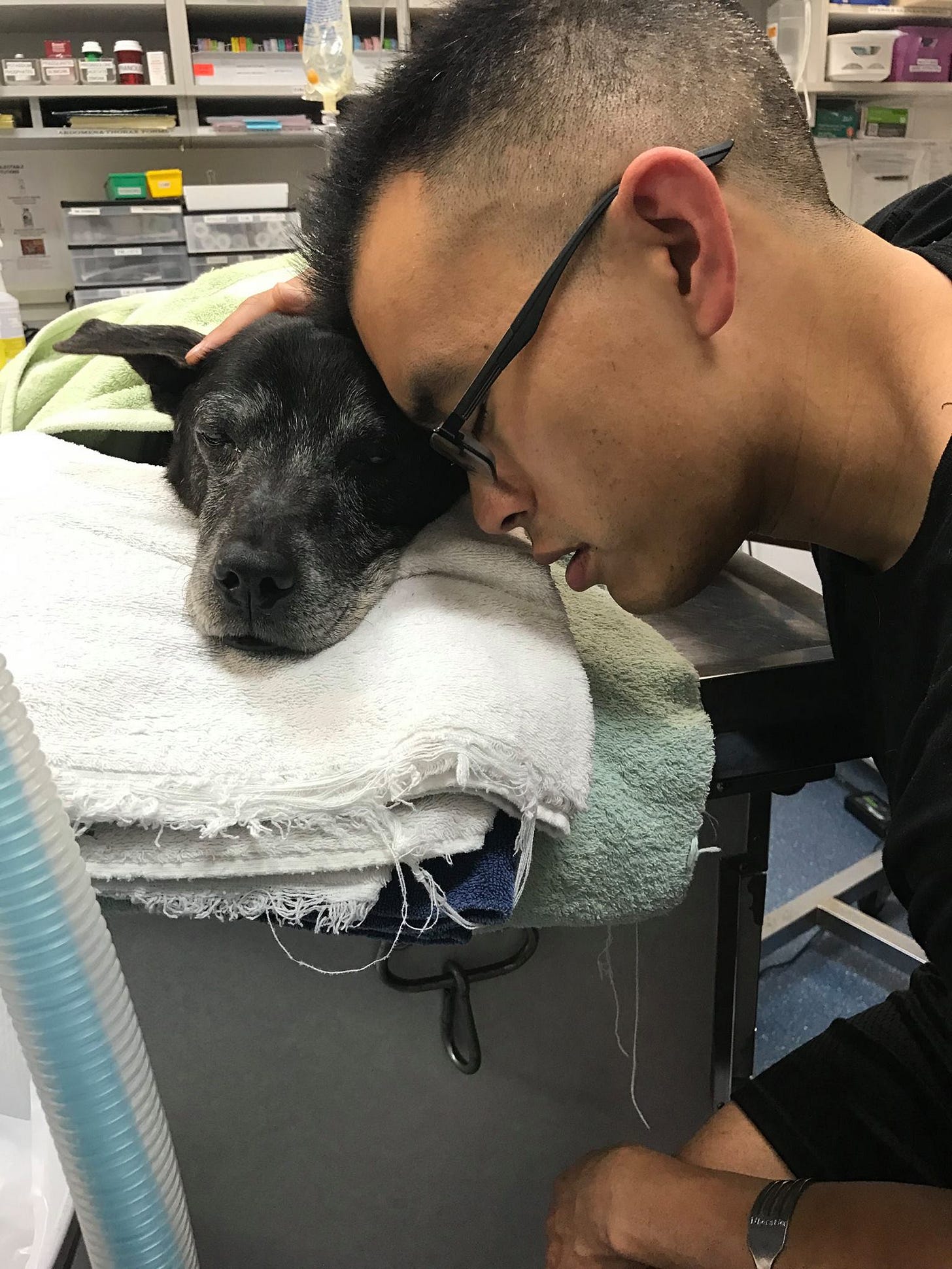What research says about grief
And how I've applied it to loss in my life. Plus, details on Lisa's funeral.

I’m grieving the loss of Lisa, my best friend for 14 years. It’s not easy. It’s been hard to sleep, or even get ready for sleep, as I am so used to having her next to me. I’ve had moments where I feel physically weak to the point that I have trouble standing. (If I weren’t in the middle of the experience, I’d be curious to understand how that is happening; the mind and body have surprising links.) And above all, I just feel defeated and tired.
Writing about her, however, has been helpful. It’s given me a positive way to experience the feelings I’m going through. And even though I cried many times in penning that blog, as I relived some brutal experiences Lisa and I survived together, I’ve also felt a sense of peace after completing the blog. When I think of Lisa, I think of everything she taught me, and above all how much she loved me, and not about the gaping hole that it’s left in my life.
As with everything in my life, however, I’m interested in evidence and not just anecdote. So I did a quick dive into the research on grief management. And it’s surprisingly sparse. There are very few randomized controlled trials on grief management, and even fewer meta studies. But what I have found, fits with my prior beliefs (and personal experience) about how to manage grief well. In short, we have to train ourselves to see the loss in a positive light. It’s a technique called cognitive behavioral therapy, which involves opening ourselves to our feelings while transforming them into more positive experiences — and it’s one of the most effective strategies not just for grief management, but depression and other mental disease.
But I want to go a step further, beyond what the evidence can show us, and suggest that there’s an even better approach to grief. Thinking of loss in a positive way has helped. However, there’s something more powerful for us to try to achieve: using grief to transform us.
Already, Lisa’s loss has done that in a small way. I’ve committed to blogging every day, after years of feeling a malaise, because of what she meant to me. But that is only the beginning. She loved me forever, and her loss will change me forever in ways that I am only beginning to understand. The best way to explain this is to share how other losses have changed me. I hope, by sharing them, anyone else going through loss can find ways for loss to inspire them, too.
Vivian.
My first dog and the first love of my life. I would come home every day from school, often crying, and collapse on the front door mat with her in my arms. We lost Vivian when she collapsed in a seizure, after a probable brain tumor, and never got back up. Her loss changed my entire sense of life priority. Previously, I had been in many ways a traditional Asian kid, focused on academics and prioritizing my grades and test scores. But I did not see her before she died because I chose to study for the GRE rather than coming home to Indy from Chicago, when it was apparent that Vivian was not doing well. I felt incredible guilt and shame when she died. But it also shook me. I promised that I would always do the right thing, and not the thing that furthered my professional goals, after she died. I hope I’ve lived up to that promise.
I don’t have any images of Vivian because we rarely took pictures when I was a child.
Annie.
My forever mama cat. Annie was a feral-ish mother cat who was taken into the pound in the freezing cold of a Chicago winter. She and her 4 kittens were scheduled to be euthanized because of a distemper outbreak at the shelter. I was not fond of cats, and I had never cared for a cat, when I was told what was happening to her. But when the volunteer director said, “This mom and her 4 kittens will die if you do not take her,” I did not have much of a choice. I went all-in and became a cat person, and took in 3 other orphaned kittens, to boot. I was told their best chance to make it was to have a nursing mom take them in, and that it was up to me, a cat novice to make that happen.
Annie turned out to be a tremendous mom. She was so fierce to my dog Natalie, when I brought her home, that Natalie cowered in fear. I was scared that such a fierce mom would not take well to new kittens. But when I plopped the kittens — Flash, Joan, and Stripey — next to her, she immediately picked each of their tiny 2-week-old bodies and brought them into her warm nursing box. And while she continued to antagonize my dogs (first Natalie, then Lisa), and eventually became fed up with her own adopted children, too, I never forgot how much she gave to save her children’s lives.
She passed of a heart attack, at an age that we think was about 10 years old, in 2011. It was not a good death. She shrieked in pain, as I tried to rush her to the emergency vet. They could not resuscitate her. I had been annoyed and impatient with her for weeks, because of her quickness to anger and fight. And she inspired me to be more patient with people in debate. Just because someone is expressing disagreement or even anger with, it does not mean they are your enemy. Annie taught me that.
Flash.
This is another hard one. I told her story here. What I did not share is how it changed me. The last few days with Flash, when I left her at the hospital instead of taking her home, taught me the importance of being present for the people I love. It’s not enough to love them, or just visit. They need to literally and physically be in your lives, and as much as possible, before it’s too late. I’m not perfect in this regard. I don’t visit my dad enough, and I don’t spend enough time with my last cat Joan. But Flash’s death still changed me.
Mom.
Other than my furry family, my mom loved me more than anyone in the world. I shared these words at her memorial about what mom taught me. But her loss also changed me.
In my earlier years, I had intense fights with my family. They never understood me; always judged me; and failed to give me the support I wanted and needed. There was the time I punched a hole in the wall, because they tried to take my computer away (the same one I built with spare parts, and that was my only window into the world of human friendship). Or the time I stole their car and crashed it — all before I had a license. We had a tumultuous relationship, with much screaming and fighting, and monthly tears. And then mom’s passing changed everything.
I reflected on all the years of conflict and thought, “Why am I fighting with people I love?” I haven’t had a single fight with any member of my family since.
Natalie.
In many ways, this was the best death. Natalie went slowly, over the span of few years, slowly dying of kidney disease. By the end, she could not walk, and it was just me and her mama (who she loved dearly and loved her), carrying her out to use the bathroom, feeding her by hand, and giving her nightly hugs.
When Natalie died in the summer of 2017, I was quite sure I would never have a human child or family. My life was absurd; I barely slept for days at a time. I was taking incredible risks in my activism. And I had just been beaten and deported from China. But when she passed, and I reflected at all the time I spent caring for her, I knew something in me had changed:
I wanted a family. There was something in the care I gave her, and in the love she gave me in return, that was transformative. I’m 40, and getting long in the tooth. But I still want that family today.
How have the losses in your life changed you? Have you been able to transform those losses into inspiration for change? Feel free to share a story or two, in the comments. But more importantly, as I said a few days ago, share with a friend offline.
—
And that brings me to my last loss, little Lisa. I don’t know this will change me. But I know that remembering her in the right way is going to help me make sure that change is for the better. It’s in that spirit, that I invite all of you to join a funeral ceremony in Berkeley at 12 pm PT. You can find details and RSVP here. I’d love for you to come in person, but given that there are many people who knew and loved Lisa but can’t attend, we’ll broadcast it online. RSVP if you’d like to attend — or drop a comment in the blog if you’re not on Facebook- as we’ll be sending the address by private message.





“There is but one thing that can never turn into suffering and that is the good we have done.“
My mom died two years ago this November, I started writing this book to cope with the grief and guilt and hopefully to help others learn from my experience. I had to stop it because it became overwhelming but you have inspired me to start back on it.
No matter what kind of being we hurt, love, and lose, the words above from Maurice Maeterlinck’s book Wisdom and Destiny were a sadly late but life renewing epiphany for me in a single sentence:
“There is but one thing that can never turn into suffering and that is the good we have done.“
You’ve done so much good and will do so much more such as writing this blog and continuing to love other beings but more wisely and well, that deeper happiness awaits you.
It really is wonderful that you can tell your story on grief with such openness. Thank you so much for that.
All the fur babes we lose over the years have their story and I must admit there is much guilt, misplaced or not, on my part. Living in a country, Brazil, where so many dogs and cats are living on the streets we cannot save them all, we just do what we can, but it never seems to be enough.